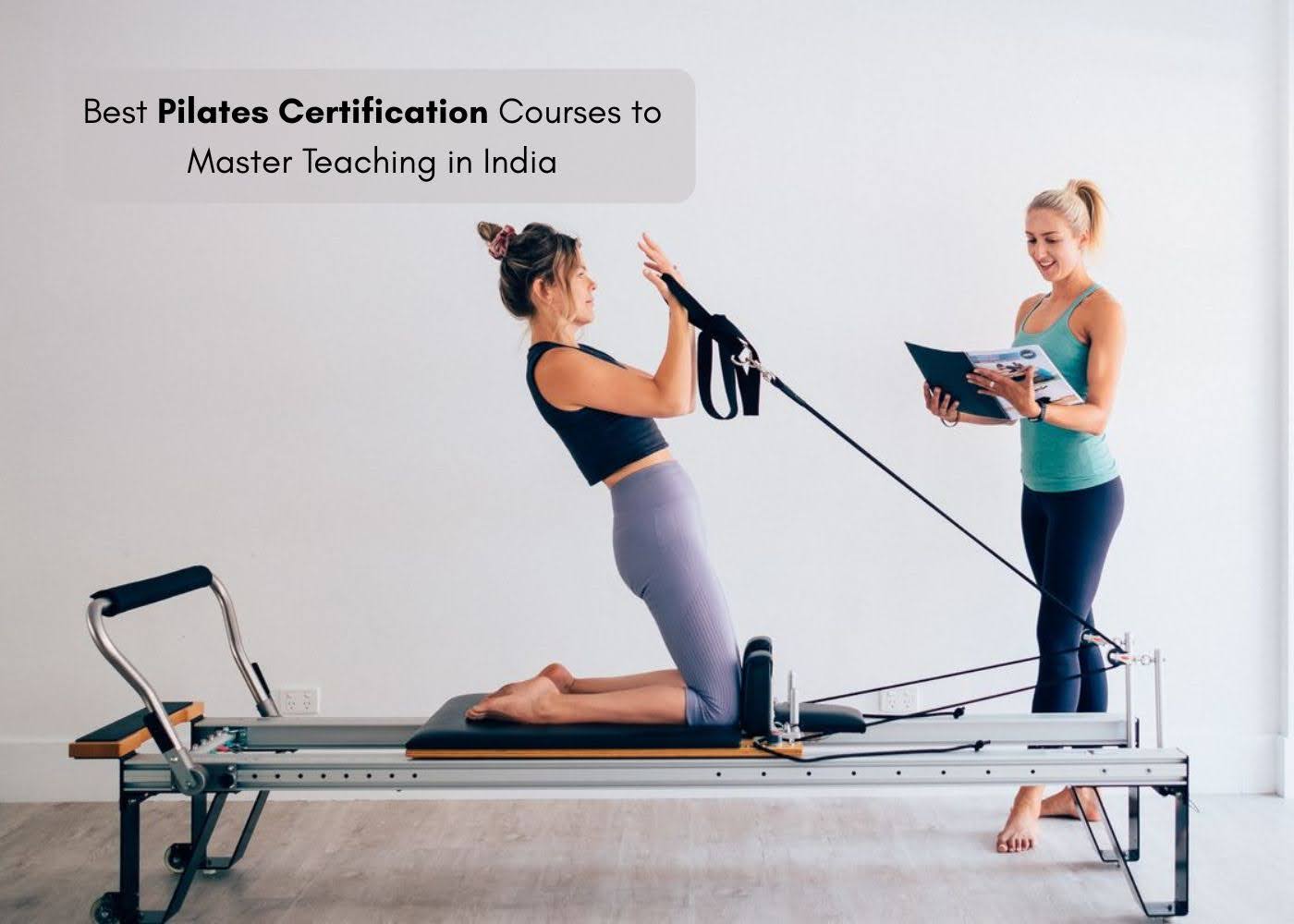
The early morning sun filters through your studio window as you guide a client through a perfectly executed teaser on the reformer. Your cues are precise, your hands-on adjustments intuitive, and you watch transformation happen in real-time. This isn’t just a career, it’s a calling. But here’s the thing: becoming a Pilates instructor who truly makes an impact requires more than passion. It demands the right training foundation.
If you’re a fitness professional looking to expand your expertise, or perhaps a yoga teacher wanting to add apparatus-based movement to your repertoire, choosing the right Pilates instructor course can feel overwhelming. With numerous programs available across India, how do you identify which certification will actually prepare you to teach with confidence and competence?
Let’s walk through what makes a Pilates certification genuinely valuable, and why your choice matters more than you might think.
What Makes a Pilates Certification Worth Your Time?
Not all Pilates training in India is created equal. Some programs rush through fundamentals in a weekend workshop, leaving you with a certificate but little actual teaching ability. Others provide comprehensive education that transforms you into a skilled movement professional.
A quality Pilates instructor course should cover movement principles that apply across all apparatus and populations. You need to understand not just the exercises themselves, but the “why” behind each movement pattern. Anatomy shouldn’t be memorized and forgotten, it should inform every cue you give. Teaching techniques matter just as much as personal practice, because knowing how to do something doesn’t automatically translate to knowing how to teach it.
The best programs also acknowledge that different students need different approaches. Modifications for prenatal clients, progressions for athletes, adaptations for those with lower back concerns, these aren’t add-ons, they’re essentials.
Comprehensive Pilates Training: What Should Be Included?
When evaluating Pilates certification options, look at the curriculum depth. A well-structured program typically includes several core components that build upon each other.
Movement Principles form the foundation. Before jumping onto equipment, you need to grasp how the body moves efficiently. This includes understanding trunk integration, whole-body movement patterns, and the relationship between stability and mobility. These principles apply whether you’re teaching mat work or using specialized apparatus.
Mat Pilates remains the cornerstone of the method. Joseph Pilates designed these exercises to be accessible yet challenging, requiring no equipment beyond your own body awareness. A thorough mat certification should progress from beginner through intermediate to advanced exercises, teaching you not just the classical sequence but also how to modify for different fitness levels and incorporate props like rings, bands, and rollers.
Reformer Training introduces you to the most iconic piece of Pilates equipment. The reformer’s springs create resistance in multiple directions, allowing for exercises that challenge strength, flexibility, and control in ways that mat work cannot. Quality reformer training progresses systematically, teaching safety protocols, setup procedures, and how to adapt exercises for various populations. You should feel confident in programming classes for beginners while also knowing how to challenge experienced clients.
Apparatus Work expands your teaching toolkit. The trapeze table (or Cadillac), chair, and barrels each offer unique movement opportunities. The trapeze table excels at assisted stretching and supported strength work. Chairs challenge stability and unilateral strength. Barrels enhance spinal mobility and core activation. Understanding how to integrate these tools makes you a more versatile instructor.
Read About: Pilates Instructor Online: Guide to Virtual Pilates Training
Pilates Certification Levels: Understanding the Progression
| Certification Level | Focus Areas | Prerequisites | Ideal For |
| Mat Level 1 | Beginner and intermediate mat exercises, teaching groups, prenatal/postnatal adaptations | Movement Principles completion, 6+ months of teaching experience recommended | Fitness instructors adding Pilates to their offerings |
| Mat Level 2-3 | Advanced mat exercises, prop integration, intermediate/advanced class programming | Mat Level 1 completion | Instructors ready to teach diverse populations |
| Reformer Level 1 | Reformer fundamentals, beginner/intermediate exercises, safety protocols | Movement Principles, 20 reformer classes recommended | Those transitioning to apparatus-based teaching |
| Reformer Level 2-3 | Advanced reformer work, specialized populations, dynamic assessment | Previous reformer level completion | Instructors developing advanced teaching skills |
| Apparatus Training | Trapeze table, chair, barrels—beginner through advanced exercises | Mat and Reformer Level 1 | Studio instructors needing full apparatus proficiency |
Why iKore Pilates Stands Out for Pilates Training in India
While several organizations offer Pilates training in India, iKore Pilates has established itself as a leader through comprehensive programming and expert instruction. As an official partner of Balanced Body, one of the most respected names in Pilates equipment and education globally, iKore brings internationally recognized standards to Indian fitness professionals.
What sets iKore apart isn’t just their affiliation. It’s the quality of instruction under Dr. Deepali Gupta, India’s Master Educator and Asia’s Pilates Ambassador. Her approach combines classical Pilates principles with contemporary understanding of movement science, preparing instructors who can think critically rather than simply memorize sequences.
The curriculum at iKore covers everything from foundational movement principles to advanced apparatus work. Whether you’re drawn to mat-based classes or want to master the full suite of equipment, their progressive program structure ensures you build skills methodically. Online and in-person options accommodate different learning preferences and schedules, making quality education accessible regardless of your location.
iKore Pune facilities feature professional-grade equipment, creating an authentic learning environment that mirrors what you’ll encounter in high-end studios. You’re not practicing on makeshift equipment or learning generic exercises; you’re training on the same apparatus you’ll teach on, learning exercises exactly as they were designed to be performed.
Read About: Unlock Your Fitness Journey with Online Pilates Classes
Choosing Between Online and In-Person Pilates Instructor Courses
The pandemic shifted education delivery across all fields, and Pilates training adapted quickly. Now you can access quality instruction through multiple formats, each with distinct advantages.
In-person training offers immediate feedback and hands-on corrections. When learning apparatus work, especially having an instructor adjust your body positioning and demonstrate proper spring tension selection, proves invaluable. The studio environment also builds community with fellow trainees, creating a support network that extends beyond certification.
Online programs provide flexibility for working professionals. If you’re currently teaching yoga or working as a gym instructor, completing coursework around your schedule becomes possible. Video demonstrations can be rewound and reviewed, helpful when perfecting complex movement sequences.
Hybrid models combine the best of both approaches. Core content delivered online allows you to progress at your own pace, while in-person intensives provide hands-on practice and teaching assessments. This format often proves most practical for busy professionals seeking comprehensive training without extended time away from work.
Consider your learning style, current commitments, and career goals when choosing. If you plan to teach apparatus-based classes immediately after certification, prioritize programs with substantial in-person components. If you’re adding mat Pilates to an existing yoga or fitness class schedule, online options might serve your needs perfectly.
Beyond Certification: Building Your Pilates Teaching Career
Earning your certification marks the beginning, not the end, of your development as an instructor. The best teachers maintain what’s called a “beginner’s mind”, staying curious, continuing education, and refining their craft year after year.
Practical experience matters immensely. Volunteer to teach classes at community centers or offer reduced-rate sessions as you build confidence. Watch experienced instructors teach whenever possible, noting how they cue, correct, and adapt to different students. Every class you teach, whether flawless or frustrating, provides learning opportunities.
Continuing education keeps your teaching fresh and relevant. Workshops on specific populations (prenatal, athletes, older adults) or particular apparatus deepen your expertise. Anatomy courses help you understand not just what muscles are working, but why certain movement patterns help or hinder clients with specific conditions.
Building a career as a Pilates instructor means developing business skills alongside teaching abilities. Whether you plan to work at established studios, open your own space, or offer private sessions, understanding basic marketing, client communication, and program design proves essential.
Making Your Decision: Questions to Ask Before Enrolling
Before committing to any Pilates instructor course, do your homework. Ask about the instructor’s credentials and teaching experience, not just their certifications, but their actual time teaching diverse populations. Question what the curriculum includes and excludes. If specialized populations matter to you (prenatal, rehabilitation, athletes), ensure the program addresses these.
Understand testing requirements and what happens if you don’t pass on your first attempt. Ask about continuing education requirements and whether the certification needs renewal. Check whether the program provides business development support or just technical training.
Finally, consider the program’s reputation within the Pilates community. Talk to graduates if possible. Where are they teaching now? Did they feel prepared after certification? Would they choose the same program again? Contact us now for more information regarding pilates.
Your Path Forward
Becoming a Pilates instructor opens doors to a rewarding career helping others move better, feel stronger, and develop body awareness that transforms their lives. But that rewarding career depends entirely on the foundation you build through quality training.
Whether you’re a physiotherapist wanting to expand treatment options, a yoga teacher adding apparatus work to your offerings, or a gym instructor ready to specialize in mindful movement, choosing the right Pilates training in India sets you up for success.
Programs like those at iKore Pilates provide the comprehensive education, expert instruction, and professional-grade equipment that prepare you to teach with confidence from day one. Their systematic curriculum progression ensures you master fundamentals before advancing, while their international affiliation means your certification carries weight beyond India’s borders.
FAQs
Q1. What qualifications do I need before starting a Pilates instructor course?
Most comprehensive programs recommend at least 6-12 months of regular Pilates practice and some teaching experience in related fields like yoga, fitness instruction, or physiotherapy. However, specific prerequisites vary by program level.
Q2. How long does it take to become a certified Pilates instructor?
The timeline depends on the certification level and format. Mat-only certifications can be completed in 1-3 months, while comprehensive mat and apparatus training typically requires 6-12 months, including practical hours and testing.
Q3. Can I teach Pilates immediately after certification?
Technically, yes, but most instructors benefit from additional practice teaching before launching independent classes. Many start by teaching at established studios or offering supervised sessions while building confidence.
Q4. Is Pilates certification recognized internationally?
Programs affiliated with globally respected organizations like Balanced Body or PMA (Pilates Method Alliance) carry international recognition, allowing you to teach in studios worldwide.
Q5. What’s the difference between mat and reformer Pilates certification?
Mat certification focuses on exercises using your body weight and small props, while reformer certification teaches apparatus-based exercises using spring resistance. Comprehensive training includes both for maximum teaching versatility.
